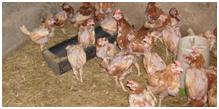StatsMiniBlog: Incidence and Prevalence
28 May, 14 | by Bob Phillips
 There are two relatively simple terms that get splattered about and are sometimes confused and can cause all sorts of difficulties.
There are two relatively simple terms that get splattered about and are sometimes confused and can cause all sorts of difficulties.
Incidence – the number of people who develop a condition in a specific period of time.
(I think of this a bit like an ‘incident’ – a thing that happened.It probably has the same etymological root. Or something)
Prevalence – the number of people who have a condition at a specific period in time
(This, like a prevailing wind, is the weight of a disease burden at one point in history.)
But there is a touch more complexity … more…
Different but similar. Life-limiting long-term conditions in children.
25 May, 14 | by Bob Phillips
 One of the great professional joys of a part-time life in or about paediatric palliative care is being made constantly aware of how much there is in the world that I know next to nothing about. (One of the great personal joys is being able to do something that improves a short life, within a multi-professional team.)
One of the great professional joys of a part-time life in or about paediatric palliative care is being made constantly aware of how much there is in the world that I know next to nothing about. (One of the great personal joys is being able to do something that improves a short life, within a multi-professional team.)
One thing that has always been a sneaking under-feeling, perhaps based in a desperate hope rather than any evidence, is that there are a core of things that children with life-limiting conditions struggle with, and that if I can keep up my skills in constipation management, pain relief, emergency seizure control and sleep hygiene I’ll be able to do some good.
Well, this month in the Archives there’s a reassuring paper that sort of agrees with my unstructured assessment. more…
Boundary spanning in collaborative networks. Asleep yet?
21 May, 14 | by Bob Phillips

Sometimes you need a massive push to take you beyond a title into reading a paper.
(Well, when I say sometimes, I mean ‘most times’. Often, the push can be the patient that has driven you to start looking. Sometimes the push is the grand round or journal club you need to present. Rarely, it’s because you just want to expand you mind a little more than “high CO2, increase frequency” … )
“Bridges, brokers and boundary spanners in collaborative networks: a systematic review” actually contains a mass of really deeply interesting ideas. more…
StatsMiniBlog: ROC plots
19 May, 14 | by Bob Phillips
A (while ago) we published an explanatory page about ROC plots in the Education and Practice journal. There are a few great reasons why we should replicate it here:
1. So people can read it more easily
2. Because it fits into the stuttering series on diagnostics
3. It saves me having to write the same thing in different words.
Underpowered and over here.
14 May, 14 | by Bob Phillips

From @aLittleMedic
We’re great fans in the Archimedes blog of trying to get people to think about the meanings and impacts of research, like askingWhat would Jack want and not believing p-values. One key idea is that of an ‘important clinical difference‘ (see – avoided significantly …) that is essential in working out if a trial is telling you two treatments really are equivalent, or if the study is just underpowered.
If you’re designing a trial you’ll be wanting to be very very sure that this difference, that you’re gong to base all your study numbers upon is, made upon the best possible grounds. Aren’t you.
Bronchiolitis. The future? March’s #ADC_JC
4 May, 14 | by Bob Phillips
So – this blog is the beginning of a rather excellent “Storify” summary of the March’s#ADC_JC which debated an RCT examining the use of heated humidified high-flow nasal cannula (HHHFNC) instead of hypertonic saline (HSS) in the management of bronchiolitis in the emergency department.
(For those who don’t know, Storify is a lovely way of capturing social media-based events and giving them a context and a thread … which the moderator of this journal club, @DrAlanGrayson has done beautifully.)
For the real experience, pop over to the full version, but whet your appetites here …
Bronchiolitis. The future?
This is the paper. Thanks to the usual excellent work behinds the scenes by the ADC elves (who I have never met, but I guess they are hard working editorial staff, run ragged by authors and reviewers (sorry, on behalf of us all for the tight deadlines ;-)) it was made open access with plenty of time for a somewhat lively crew to assemble.
Introduction
Welcome to the March iteration of #adc_jc After some great chat over the last two months, we’re back to RCTs
— ADC_JC (@ADC_JC) March 24, 2014
— CarmenSoto (@gourmetpenguin) March 24, 2014
This is either a welcome return to the important ground of “hard” science from the “fluffy” human factors and qualitative papers that we’ve covered recently or me taking the easy way out from the more difficult aspects of MedEd. I reckon there’s plenty of room withinFOAM for both.
Bronchiolitis
For less-experienced readers, bronchiolitis is a viral illness, classically caused by Respiratory Syncytial Virus, occurring in the under-2 age group and in the winter months. The first “bronchy” cough of the year, usually in late September in the UK, is a clarion call to the children’s doctor and a reminder to order more caffeine – for the apnoeic kids and for the doc, as it may be a long winter of long shifts…
Guest Blog: When it all backfires
27 Apr, 14 | by Bob Phillips
 Although vaccines are probably one of the most effective public health interventions to reduce mortality and morbidity, it’s apparent that vaccine ‘scares’, often fueled by mass-media have caused some parents to question their value and safety. Wile we paediatricians try hard to keep vaccination rates up, we don’t know how effective are our messages or how best to alter misperceptions. This is why a recent trial by Nyhan et al is important. It measures four different types of messages and their impact on the attitudes of parents toward vaccinations. more…
Although vaccines are probably one of the most effective public health interventions to reduce mortality and morbidity, it’s apparent that vaccine ‘scares’, often fueled by mass-media have caused some parents to question their value and safety. Wile we paediatricians try hard to keep vaccination rates up, we don’t know how effective are our messages or how best to alter misperceptions. This is why a recent trial by Nyhan et al is important. It measures four different types of messages and their impact on the attitudes of parents toward vaccinations. more…Let me tell you a story … journal clubs as literary criticism
23 Apr, 14 | by Bob Phillips

From the worlds greatest comic
Have you ever been to a journal club and had the slight suspicion that what you are addressing isn’t quite on-target? (Ever been part of #ADC-JC and realised that most of Twitter appears to be whispering at the back and passing notes to each other?) Ever considered if journal club really is a scientific pursuit?
more…
more…
A spoonful of Septrin helps the carinii stay down?
16 Apr, 14 | by Bob Phillips
 While the diagnosis of Pneumocystis carinii Pneumonia (yes – I know it’s changed it s name – but really, do you ask for Beanz when you want something tomatoey to go with your sausage, egg, black pudding, fried bread, mushrooms and juice in a morning?) may not be everyone’s weekly occurrence, there are probably a handful of children who are trying very hard not to develop in in your town.
While the diagnosis of Pneumocystis carinii Pneumonia (yes – I know it’s changed it s name – but really, do you ask for Beanz when you want something tomatoey to go with your sausage, egg, black pudding, fried bread, mushrooms and juice in a morning?) may not be everyone’s weekly occurrence, there are probably a handful of children who are trying very hard not to develop in in your town.
The traditional approach to prophylaxis has been a spoonful of Septrin (TM), which got modifed to three times/week. Most of the UK leukaemia fraternity now moves with a twice/week, twice/day approach. But in Italy, there are centre which use a once-per-week schedule.
“On the basis of large RCT?” I hear you ask, knowing the great reputation paed onc has for developing research.
“Not .. quite..” comes back the embarrassed answer. “But there is some evidence …?”
Guest Blog: My campaign for free-range consultants
13 Apr, 14 | by Bob Phillips
 You may not have noticed, but there was a subtle shift inBritain’s food a couple of years ago. After many years of campaigning, most notably on the telly by bucolic chef Hugh Fearnley-Whittingstall but also by such animal welfare luminaries as PETA andCompassion in World Farming, the UK finally got rid of battery hens who live in cramped conditions and have little access to light and the chance to exhibit normal chicken behaviour. However there continues to exist widespread cruelty occurring on a daily basis but this is directed towards humans.
You may not have noticed, but there was a subtle shift inBritain’s food a couple of years ago. After many years of campaigning, most notably on the telly by bucolic chef Hugh Fearnley-Whittingstall but also by such animal welfare luminaries as PETA andCompassion in World Farming, the UK finally got rid of battery hens who live in cramped conditions and have little access to light and the chance to exhibit normal chicken behaviour. However there continues to exist widespread cruelty occurring on a daily basis but this is directed towards humans.
Thousands of consultants will today be trapped in their offices. They are subjected to the harsh torture of fluorescent light and blinking 50Hz screens of computer screens displaying, in the main, endless, pointless emails that are killing the art of conversation. These poor creatures are kept from normal doctor behaviour such as seeing patients and teaching and training their junior colleagues by a cruel system that virtually enslaves them to a life of lukewarm instant coffee and Microsoft Outlook. Like prisoners under heavy supervision their brief external forays are strictly regulated; alarms demanding their presence at meetings that are unproductive and have little in the way of intellectual or emotional challenge.
fluorescent light and blinking 50Hz screens of computer screens displaying, in the main, endless, pointless emails that are killing the art of conversation. These poor creatures are kept from normal doctor behaviour such as seeing patients and teaching and training their junior colleagues by a cruel system that virtually enslaves them to a life of lukewarm instant coffee and Microsoft Outlook. Like prisoners under heavy supervision their brief external forays are strictly regulated; alarms demanding their presence at meetings that are unproductive and have little in the way of intellectual or emotional challenge.
 fluorescent light and blinking 50Hz screens of computer screens displaying, in the main, endless, pointless emails that are killing the art of conversation. These poor creatures are kept from normal doctor behaviour such as seeing patients and teaching and training their junior colleagues by a cruel system that virtually enslaves them to a life of lukewarm instant coffee and Microsoft Outlook. Like prisoners under heavy supervision their brief external forays are strictly regulated; alarms demanding their presence at meetings that are unproductive and have little in the way of intellectual or emotional challenge.
fluorescent light and blinking 50Hz screens of computer screens displaying, in the main, endless, pointless emails that are killing the art of conversation. These poor creatures are kept from normal doctor behaviour such as seeing patients and teaching and training their junior colleagues by a cruel system that virtually enslaves them to a life of lukewarm instant coffee and Microsoft Outlook. Like prisoners under heavy supervision their brief external forays are strictly regulated; alarms demanding their presence at meetings that are unproductive and have little in the way of intellectual or emotional challenge.
This foul situation must stop and today, I call for your support.


No comments:
Post a Comment